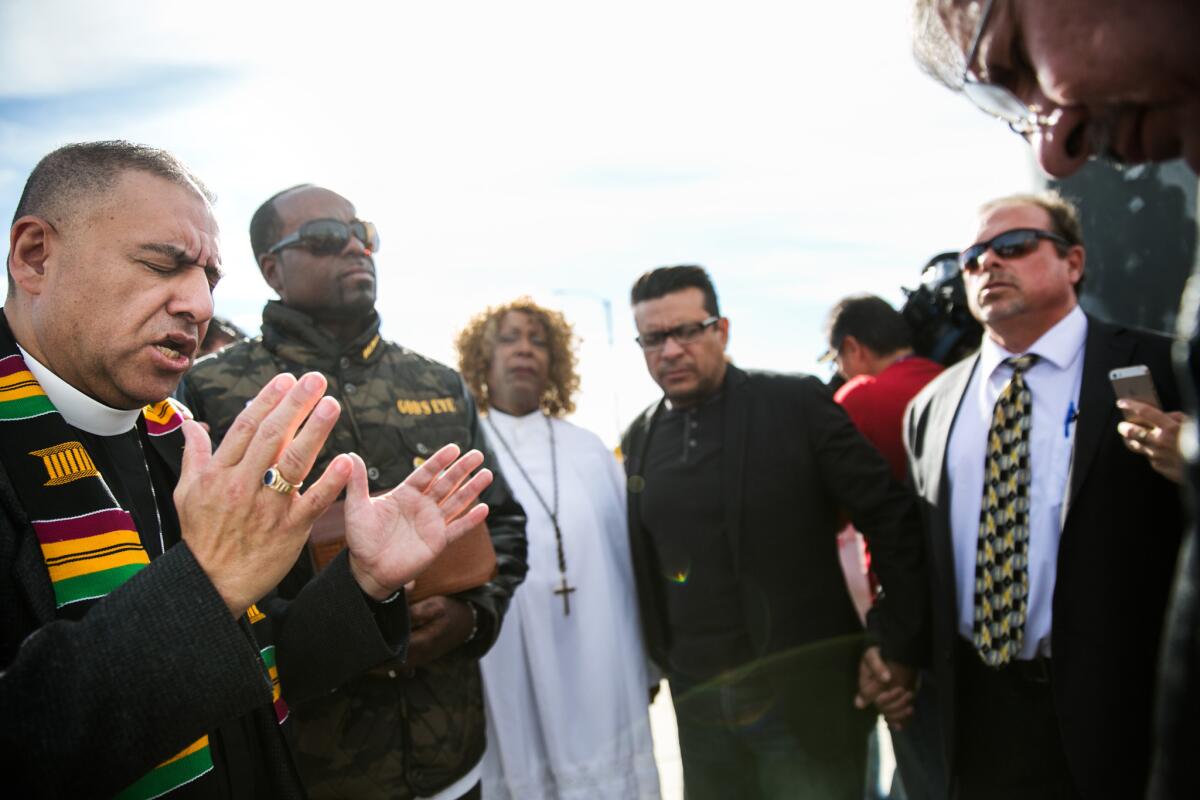Op-Ed: In response to mass killings, prayer might be as valid as more gun control laws

Pastor Juan Carlos Mendez, left, leads a coalition of church leaders as they bow their heads in prayers for the victims of the mass shooting in San Bernardino.
- Share via
Just a few weeks after endorsing the #PrayForParis hashtag campaign, the Daily News decided that prayer is a perverse response to the San Bernardino massacre. The News’ cover Thursday shouted “God Isn’t Fixing This!” next to tweets from Republican presidential candidates, each one with the word “prayers” highlighted to embarrass them. The implication was that the politicians were hiding behind their prayers when they could be solving the “gun scourge.”
The New York tabloid wasn’t alone. The Huffington Post ran an article that extended the accusatory finger beyond politicians to the broader public on social media who offered their thoughts and prayers in messages of sympathy and grief. There was a simple takeaway: Screw your prayers, do something!
People pray for things that our laws and government cannot provide: eternal rest for the victims, consolation for the bereaved, resolve and strength for first responders.
Of course it’s annoying to see rote statements from politicians about their prayers. They feel scripted and repetitive now that America suffers through high-profile mass shootings on a regular basis. Besides, Tweeting about prayers is a good indication that you’re not actually praying. Or, at least, not praying well. (Matthew 6:5)
On the other hand, in the age of Twitter, the press and the public now demand statements from politicians about enormities even as they are unfolding. What else can they say?
FULL COVERAGE: San Bernardino shooting | Shooting updates
The suddenly popular accusation that prayer is an ugly, insincere and insufficient response to tragedy misconstrues why people pray. Mary Elizabeth Williams, in a scorching essay for Salon on these empty gestures, wrote that “it’s actually offensive for public figures who could take action to curtail gun violence to foist the burden of healing the broken lives that violence leaves behind on God.”
But the truth is that people pray for things that our laws and government cannot provide: eternal rest for the victims, consolation for the bereaved, resolve and strength for first responders. They pray seeking understanding of God’s will in a world marred by sin and death. Prayer doesn’t exhaust all of our duties in a human tragedy, and nobody claims that it does. Believers hope that prayer will strengthen them to respond to tragedy with actions tempered by good will, wisdom and compassion. Politicians may be praying this way, and sincerely, even if their judgment leads them to different conclusions later. Even if their judgment is terrible.
An anti-prayer critic might respond: Politicians should instead publicly promise to work for policies that that would prevent future violence. And some did just that. Perceiving the events at San Bernardino first as an issue of firearms control, not terrorism, Hillary Clinton and Bernie Sanders sent out messages about taking action to stop gun violence. Martin O’Malley named an enemy: the National Rifle Assn.
Yet, like prayer, rote tweets urging us toward policy responses, whether they are aimed at controlling guns or discovering terror plots before they happen, demand a kind of blind faith and hope. Arguably they demand even more credulity than prayer.
If the American public suddenly acceded to restrictive gun-control laws, mass shootings like the one in San Bernardino would likely happen from time to time anyway. Even those who support some new measures, myself included, must concede that the kinds of policies that would do the most to reduce firearm fatalities may have little or no effect on terrorist plots or determined mass shooters. After all, French gun-control laws did not stop the Bataclan theater massacre. (And the use of explosive devices and GoPro cameras is an indication that the San Bernardino killers were more like the Paris attackers than, say, Dylann Roof or James Holmes.)
In the first hours after the shooting, I felt far more comfortable presuming that God is merciful and answers prayers than that my own views on gun control, or anyone else’s, would turn out to be directly relevant. I can open the Scriptures to find an account of God’s mercy in the face of man’s capacity for wickedness. I cannot, however, explain the dramatic decline of violent crime and gun homicide in an America over the last two decades. Not when the country is constantly loosening its gun laws, and the national stockpile of privately held weapons keeps growing.
Without evidence, why should I assume that closing private-sales loopholes, imposing magazine limits or instituting more invasive background checks would have prevented the violence in San Bernardino? If only the Daily News’ skepticism about the sincerity and efficacy of prayer extended just a little further.
The prayer-skeptics will work out their policy response in fear and trembling as we learn more about the latest atrocity. I wish them luck. As a citizen, I’ll dutifully consider them. As a pundit I’ll offer criticism, hopefully constructive. Until then my thoughts return again and again to the victims. And even without intending, I start to pray.
Michael Brendan Dougherty writes about politics for the Week. He is the founder of the Slurve, a newsletter about baseball.
Follow the Opinion section on Twitter @latimesopinion and Facebook.
MORE FROM OPINION
Terrorism? Angry worker? Whichever, the carnage came from legal guns
That period of nonpolitical mourning after a shooting? We’re past that now
San Bernardino shooting just opened up a can of worms far bigger than gun control
More to Read
A cure for the common opinion
Get thought-provoking perspectives with our weekly newsletter.
You may occasionally receive promotional content from the Los Angeles Times.










